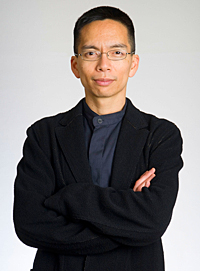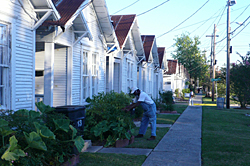World-renowned artist and computer scientist John Maeda will serve as opening speaker for “Economies: Art + Architecture,” the first joint conference of the Association of Collegiate Schools of Architecture (ACSA) and the National Council of Art Administrators (NCAA).
The conference, which takes place Nov. 4-7, will be hosted by the Sam Fox School of Design & Visual Arts at Washington University in St. Louis.

John Maeda
“Bringing top academic leaders to St. Louis for ‘Economies: Art + Architecture’ is indeed a terrific honor,” said Carmon Colangelo, dean of the Sam Fox School and E. Desmond Lee Professor for Collaboration in the Arts.
“This will promote camaraderie and collaboration between architects, designers, educators and visual artists from across North America, while also facilitating a unique exchange of ideas about creative entrepreneurship and leadership,” Colangelo added. “Hopefully it will serve as an important catalyst for interdisciplinary discussions within and between the professions.”
Colangelo is co-chairing the conference with Peter MacKeith, associate dean of the Sam Fox School of Design & Visual Arts and associate professor of architecture.
“The conference aligns precisely with the mission of the Sam Fox School in its emphasis on collaboration, social and environmental responsibility and the intderdispcimplary relationship between architecture, design and art.” Mackeith said. “In effect, a creative ‘economy of means’ may well be the most productive and necessary emphasis across our disciplines in meeting the challenges of the near future.”
In conjunction with the conference, the Sam Fox School and the Skandalaris Center for Entrepreneurial Studies are collaborating to present three Skandalaris Awards in art and design.
The Skandalaris Award for Excellence in Art + Architecture recognizes an artist, architect or designer whose individual or collaborative works, projects or research have had profound and lasting impacts on society, culture or the environment.

Rick Lowe’s Project Row Houses in Houston.
Receiving the award will be Rick Lowe, founder of Project Row Houses in Houston, a large-scale development founded on the principle that art can be the basis for revitalizing depressed inner-city neighborhoods.
Two Skandalaris Awards for Entrepreneurship in Design & Visual Arts will honor individuals who have demonstrated leadership and entrepreneurship in architecture, design and the visual arts, particularly through community-based and/or sustainable practices.
Receiving the awards will be Anna Rubbo, founder of the interdisciplinary Global Studio, which engages design students in participatory action research and community development; and John Bielenberg, founder of Project M, an intensive immersion program that encourages designers, writers, filmmakers and photographers to use their work to engage communities around the country and the world.
Each award carries a $20,000 honorarium, which may be used to help support new or ongoing projects and/or creative research. All three recipients will participate in a variety of presentations and discussions.
Opening the conference will be Maeda’s talk, titled “Creative Leadership,” which takes place at 5:30 p.m. Nov. 4 in Graham Chapel. Co-sponsored by the university’s Assembly Series, the talk is free and open to the public. For more information, visit assemblyseries.wustl.edu.
Subsequent conference sessions (for which registration is required) will take place at the Chase Park Plaza Hotel and will explore sustainability issues, the role of emerging technologies, new degree programs and other topics. For a full schedule or to register, visit acsa-arch.org or ncaaarts.org.
PARTICIPANT BIOGRAPHIES

Anne Rubbo, founder of Global Studio, works with residents of Diepsloot, South Africa, a township located in the northern section of Johannesburg.
Maeda — named one of the 75 most influential people of the 21st century by Esquire magazine — has worked for more than a decade to integrate technology, education and the visual arts, redefining the use of electronic media as a tool for creative expression. Combining skilled computer programming with sensitivity to traditional artistic concerns, Maeda’s work helped develop the interactive motion graphics that are prevalent on the Internet today.
Now president of the Rhode Island School of Design, Maeda remains a pioneering voice for “simplicity” in the digital age, championing the use of the computer for people of all ages and skill levels. His own work can be found in the permanent collections of the Museum of Modern Art, the San Francisco Museum of Modern Art and the Cartier Foundation in Paris, among others. He is author of four books — including the retrospective MAEDA@MEDIA (2000) and The Laws of Simplicity (2006) — and a trustee of the Smithsonian’s Cooper-Hewitt National Design Museum.
Lowe founded Project Row Houses in 1993 in one of Houston’s oldest African-American neighborhoods. What began as 22 shotgun-style houses on one block has grown to six blocks encompassing 12 artist exhibition and/or residency spaces, seven transitional houses for young mothers, office spaces, a community gallery, a park, and low-income residential and commercial spaces. Lowe is also a co-founder of the Watts House Project in Watts, CA, a similar large-scale artwork-as-urban development, and is active on the National Resource Team for Transforma Projects, a collective of artists and creative professionals formed in New Orleans after Hurricane Katrina.
Rubbo, an associate professor of architecture at the University of Sydney, launched Global Studio in 2005 to meet the challenges of global poverty and sustainable urbanization. Working in collaboration with township communities, NGOs and local universities and governments, the studio seeks to enable community-based economic development through design and the arts. To date Global Studio has provided intensive programs and associated conferences in Istanbul (2005), Vancouver (2006) and Johannesburg (2007-08). Over the last two years it has worked in Diepsloot, South Africa, to improve housing, develop community arts programs and foster local knowledge and cultural capital.

Part studio, part performance space, this plain white container serves as a mobile base-of-operations for Project M, the intensive arts immersion program founded by designer John Bielenberg.
Bielenberg began Project M, now based in based in Greensboro, AL, in 2003. Built around a creative exercise called “Thinking Wrong,” Project M encourages participants to challenge the status quo by reexamining design assumptions. Known for its traveling “expeditions,” the group has delivered equipment and supplies to Gulf Coast designers displaced by Hurricane Katrina and left its mark in Ghana, through work with The Women’s Trust micro-financing organization. Another project converted a used ambulance into a rolling design studio, while their book This is not grass (2007) raised money to build parks in East Baltimore. Meanwhile the ongoing “Buy a Meter” print-and-web campaign has helped nearly 100 families in rural Hale County, AL, gain access to clean drinking water.
SPONSORS
In 1912 Washington University became one of 10 founding members of the ACSA, a non-profit membership association dedicated to advancing the quality of architectural education. Today the ACSA represents more than 250 schools in several membership categories — including all accredited programs in the United States and government-sanctioned schools in Canada — as well as more than 5,000 architectural faculty. In addition the ACSA includes more than 500 supporting members composed of architecture firms and practitioners, product associations, individuals and students.
The NCAA is an organization of academic professionals dedicated to creating and maintaining a vital network of arts administrators. An affiliate of the College Art Association, the group promotes communication between institutions and provides meaningful collaborative opportunities for arts administrators within academia as well as with leaders in related arts organizations. Members are invited to participate in the annual NCAA conference, which spotlights current trends in arts administration and offers forums, guest speakers, and social events.
The Sam Fox School is a unique collaboration in architecture, art and design education. Offering professional studio programs at both the undergraduate and graduate levels, the Sam Fox School links four academic units — the College of Art, College of Architecture, Graduate School of Art and Graduate School of Architecture & Urban Design — with the university’s nationally recognized Mildred Lane Kemper Art Museum.
For more information about the Sam Fox School, visit samfoxschool.wustl.edu.